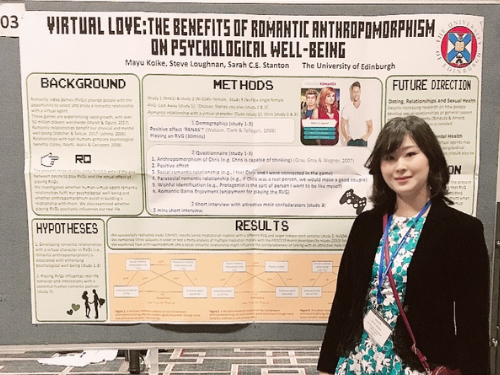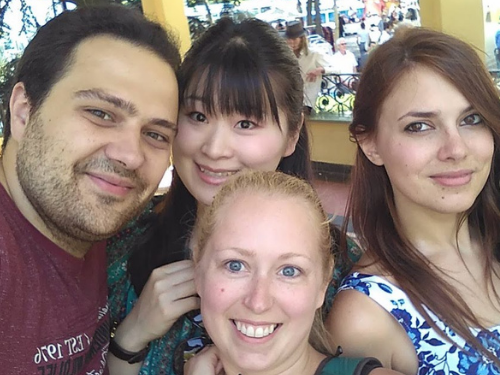By Hiroshima University Department of Public Relations
Romantic anthropomorphism is a new field pioneered by HU Assistant Professor Mayu Koike. It combines both anthropomorphism and romantic relationship research. (Photo courtesy of Mayu Koike, Hiroshima University)
Anthropomorphism — the attribution of human traits to non-human beings — can be seen everywhere in Japan from mangas and animes to games, including ones that simulate dating.
Although feelings of infatuation with fictitious characters isn’t an alien concept in human psychology, the obsession displayed by fans within Japan’s romance video game subculture has often been viewed as bizarre if not perverse. Many fear that people may end up substituting real-world connections for what is deemed as unnatural digital intimacy.
One of the many permeating myths surrounding video gaming is the fear that it breeds isolation. And this myth has resurfaced with renewed alarm as dating video games gained popularity outside Japan. A Japanese psychologist's research is showing initial evidence that our fear may be far from true and fraught with misunderstanding.
Psychologist Mayu Koike’s pioneering research on romantic anthropomorphism explores why some people woo virtual lovers and how it may be redefining social connections in the modern world.
“Japan is one of the leading countries of anthropomorphism in the world. These sub-cultures are extremely popular, with global fans. Some people even imagine fictional characters as if they are present in real life,” Koike, an assistant professor at Hiroshima University’s Graduate School of Humanities and Social Sciences, said.
Koike, whose research focuses on the relations between people and virtual agents, examines how relationships research can be used to understand new technologies.
“I conducted studies and cultivated the new field from scratch. Romantic anthropomorphism is a new field combining both anthropomorphism and romantic relationship research,” she explained.
“As a person who was born and raised in Japan, I am interested in exploring the benefits of forming a romantic relationship with virtual agents and whether it has the potential to improve psychological well-being.”
Loneliness epidemic and COVID-19 pandemic
In 2020, her research found that the use of touch and a human-like voice were perceived as important factors in anthropomorphized relationships. Current dating video games usually rely on interactive bots with pre-scripted answers. She and her colleagues also discovered that the desire to develop social skills and alleviate negative feelings is among the reasons why many are attracted to playing dating video games.
“Some people struggle to make friends or feel isolated. Loneliness negatively affects both our physical and mental health. Especially due to the COVID-19 pandemic, many people experienced isolation and depression,” Koike explained.
Koike’s research may revolutionize how dating games are played in the future by helping developers understand what players pursue in it.
“Virtual agents have grown increasingly common in the world around us so if we can lead the way in understanding these new relationships — human and virtual agents — it might help to reduce loneliness and improve well-being,” she said.
‘Unique way’ of finding connections
Koike’s latest research in 2021 showed that building an authentic relationship with virtual agents is important to have a greater positive affect, which in psychology is associated with a more optimistic outlook in life. As gamers find that romance with game characters boosts their mood and helps build real-life social skills, she believes it would be beneficial if society could change their misconceptions about relationships with virtual entities.
She also started a side project to define the emotion of “moe,” a concept originally established in Japan’s anime and manga subcultures. It captures the idea that humans might fall in love with virtual characters. Her findings showed that both Japanese and British citizens can understand “moe” and have experienced this as a positive emotion.
“If a person should feel ‘moe’ strongly, they will follow to feel a pleasant feeling more strongly too,” she said.
She has received many awards for her pioneering research, encouraging her to continue her work. Among these were the Psychology of Media and Technology Preconference Award in 2020 from the Society for Personal and Social Psychology (SPSP) and the International Registration Award in 2021 also from SPSP.
“This research identifies a unique way that people find a connection in the modern world and provides novel insight into the fields of anthropomorphism and relationship science.”
(Research news authored by Mikas Matsuzawa)

 Home
Home
















